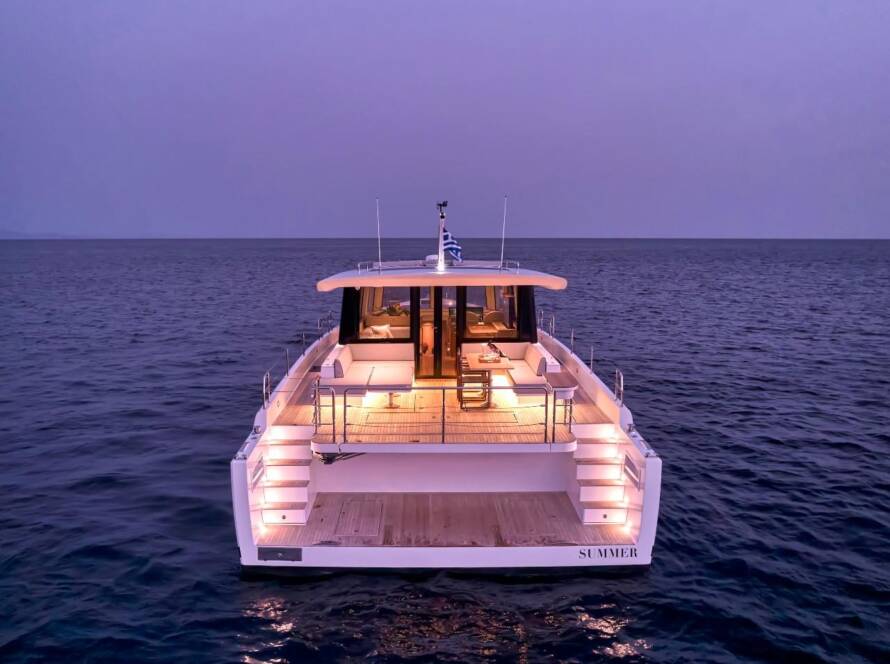As the global demand for cleaner and more sustainable energy solutions continues to rise, the yachting industry is making a significant shift toward alternative energy sources. Among the most promising innovations is the hydrogen-powered engine, a breakthrough that could revolutionize the future of yachting. These engines use hydrogen as a fuel, emitting only water vapor, which drastically reduces the carbon footprint compared to traditional diesel or gasoline-powered engines. For yacht enthusiasts who are mindful of the environment, this development represents an exciting leap toward cleaner, greener seas.
What Are Hydrogen-Powered Engines?
Hydrogen-powered engines, or hydrogen fuel cells, generate electricity through a chemical reaction between hydrogen and oxygen. This process produces energy to power the yacht’s propulsion systems, eliminating harmful emissions such as CO₂ and NOₓ, typically associated with fossil fuels. The only by-product of this reaction is water, making it one of the most eco-friendly options available for marine travel. Additionally, hydrogen can be stored and transported in various forms, making it a versatile solution for different types of yachts, from smaller vessels to large superyachts.
Benefits for the Yachting Industry
- Eco-Friendly Navigation: One of the main advantages is the drastic reduction in environmental pollution, both in terms of emissions and noise. The near-silent operation of hydrogen-powered engines significantly minimizes noise pollution, providing a more serene sailing experience.
- Increased Range: Hydrogen fuel cells can provide a longer cruising range compared to traditional batteries, making them suitable for long-distance ocean crossings or extended periods at sea without the need to refuel frequently.
- Future-Proof: With stricter environmental regulations on the horizon, hydrogen-powered yachts are seen as future-proof vessels, ensuring compliance with upcoming emissions standards set by governments and international organizations.
Hydrogen-Powered Technology on the Global Stage: Olympic Games and Public Transport
Hydrogen fuel cell technology is not only making waves in the maritime sector but also being utilized for large-scale global events. Notably, during the 2024 Paris Olympic Games, hydrogen-powered vessels will play a key role in the opening ceremony, offering a green and sustainable alternative to conventional vessels. Hydrogen ferries and boats are expected to transport athletes, officials, and spectators, showcasing the technology’s potential in reducing the environmental impact of large international gatherings. This public demonstration is expected to bring hydrogen energy further into the spotlight, emphasizing its application across various transport sectors.
Beyond maritime uses, hydrogen fuel technology is gaining popularity in public transportation systems around the world. Hydrogen-powered buses are now operating in cities like Tokyo and London, offering zero-emission transit for daily commuters. These buses utilize the same fuel cell technology, highlighting the versatility of hydrogen in reducing emissions, noise pollution, and dependence on fossil fuels. The Olympic Games will also see the deployment of hydrogen-powered buses as part of its sustainable transport initiatives, reinforcing the message of an eco-friendly future.
An Example: The Aqua Hydrogen Superyacht
One remarkable example of hydrogen-powered yacht innovation is the Aqua Superyacht, designed by Sinot Yacht Architecture & Design. Aqua is a cutting-edge luxury yacht concept powered entirely by liquid hydrogen and fuel cells. Measuring 112 meters, this superyacht is built with sustainability at its core, boasting an advanced propulsion system that uses hydrogen stored in vacuum-sealed tanks cooled to -253°C. The yacht can travel up to 3,750 nautical miles at a speed of 17 knots, making it an ideal vessel for long-distance cruising in total comfort, while leaving almost zero environmental impact.
The sleek and modern design of Aqua, combined with its technological prowess, represents a shift towards a new era of yachting that prioritizes sustainability without compromising on luxury. The yacht’s design also includes a cascading infinity pool, spacious outdoor lounges, and a minimalist interior — all in line with eco-conscious yet opulent living.
Challenges and Future Outlook
Although hydrogen technology is advancing rapidly, there are still some hurdles to overcome. The infrastructure for hydrogen refueling is still in its infancy, and producing hydrogen can be energy-intensive unless derived from renewable sources. However, as technology progresses and demand grows, these challenges are expected to diminish, paving the way for more widespread adoption of hydrogen-powered yachts.
For yacht lovers and marine enthusiasts, hydrogen engines symbolize a future where luxury and sustainability coexist. This innovation not only addresses the environmental impact of sailing but also opens the door to new possibilities for longer and more peaceful voyages at sea.


